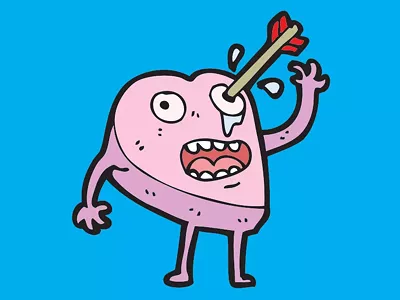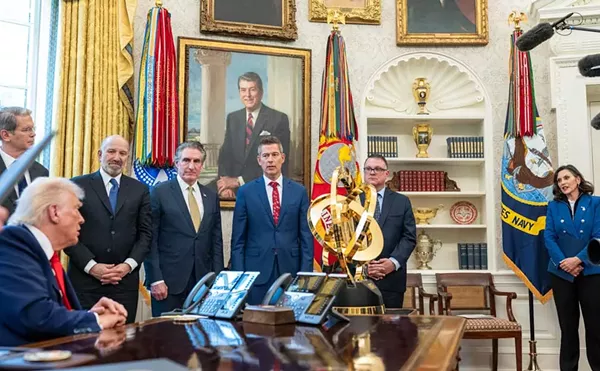
Audio By Carbonatix
[
{
"name": "GPT - Leaderboard - Inline - Content",
"component": "35519556",
"insertPoint": "5th",
"startingPoint": "3",
"requiredCountToDisplay": "3",
"maxInsertions": 100,
"adList": [
{
"adPreset": "LeaderboardInline"
}
]
}
]
Doing justice
Re: "Detroit's Greatest Hits that should have been" (Nov. 10) Brett Callwood mention of the Rockets' "No Ballads" does justice for one of Detroit's most beloved rock front man: Dave Gilbert. In his time, Dave was the baddest motherfucker to walk on stage, grab a mic and deliver the goods. I'm tired of all the media bullshit we constantly hear about country music sell-out Kid Rock and his walk to fame; for many 'round here, there's little doubt that it was the late Dave Gilbert who made an indelible mark in their rock 'n' roll hearts. Listening to Desire at 10 is a heavenly experience, God Bless Dave's soul. —Ken Hreha, Dryden
Giving us the works
The much-ballyhooed "Detroit Works" land use and economic development reinvention seems to be much ado about nothing, based on the team's meager offerings so far. They've shown no substance and lots of well-funded corporate PR, while calling for more meetings as occasions for their consultants to strut their stuff. What any of this has to do with reaching the majority of the people of our city with a powerful message of change, health, prosperity and social justice is anybody's guess. But team leaders Toni Griffin, Marja Winters and Karla Henderson have a brilliant future in comedy, if your cover story is any indication ("Re-Detroit," Nov. 17).
Griffin sees her job as conveying information that's "easy to understand" and "in ways that people can understand, people who don't talk like us in the profession." The punch line is from National Public Radio's venerable Dr. Science spoof: I know more than you do! I'm immensely grateful to Kresge Foundation funders for condescending yet again to me and my whole community, as if we didn't know anything, so they can teach us how to be better Detroiters who interact with a better class of people. As soon as I learn to talk like a professional planner, maybe my thoughts about things like sustainability, community economic development and human rights will have some weight in the minds of people who matter! I can barely contain my enthusiasm at the prospect.
Henderson says they will be "talking honestly and transparently," and being "forthright." This is hilarious. The Detroit Works team's endless repetition of their mantra, "There is no plan," in public meetings with thousands of Detroiters in September, was followed by Bing's interview with Forbes Magazine in October, in which he revealed, among other elements of a half-baked "plan," that they've already identified 15 viable neighborhoods and 39 they consider "unhealthy." The power brokers will make all the decisions, do what they want, and justify them later with jargon and PowerPoint presentations.
Winters says the Detroit Works team is "being up-front and realistic and open about what the real problems are. ..." Who knows what the Detroit Works team members think are the "real problems," other than the foundations paying the bills and the big business interests that control Bing? Nobody does, because they aren't engaging the community in dialogue or consultation. They're trying to baffle us with bullshit!
It would be funny if it weren't so tragic. What Detroit needs is a democratically facilitated, open "visioning" process that includes regular working people in a robust discussion about how to provide direction, coordination and hope to the promising initiatives that are already under way in our city (no thanks at all to Detroit Works). What we are getting instead is a screwball comedy version of planning and engagement, where "there is no plan" except "more meetings" as a toxic substitute for effective leadership. Get real. —Tom Stephens, Detroit
Legalize it
Not only should medical marijuana be made available to patients in need, but adult recreational use should be regulated. Drug policies modeled after alcohol prohibition have given rise to a youth-oriented black market. Illegal drug dealers don't ID for age, but they do recruit minors immune to adult sentences. So much for protecting the children. And throwing more money at the problem is no solution. Attempts to limit the supply of illegal drugs while demand remains constant only increase the profitability of drug trafficking. The drug war doesn't fight crime, it fuels crime. Taxing and regulating marijuana, the most popular illicit drug, is a cost-effective alternative to never-ending drug war. As long as marijuana distribution is controlled by organized crime, consumers will continue to come into contact with hard drugs. —Robert Sharpe, policy analyst, Common Sense for Drug Policy, Washington, D.C.





